 Petzlover
Petzlover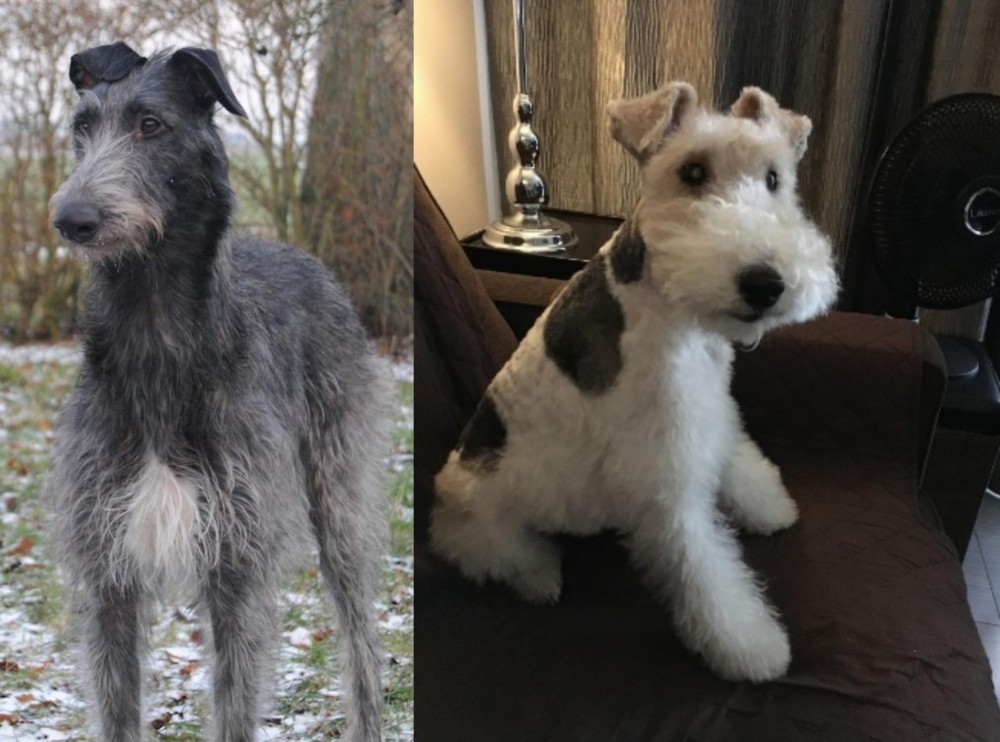 Both Scottish Deerhound and Wire Haired Fox Terrier are originated from United Kingdom. Scottish Deerhound may grow 43 cm / 17 inches higher than Wire Haired Fox Terrier. Scottish Deerhound may weigh 41 kg / 91 pounds more than Wire Haired Fox Terrier. Scottish Deerhound may live 5 years less than Wire Haired Fox Terrier. Scottish Deerhound may have more litter size than Wire Haired Fox Terrier. Scottish Deerhound requires Low Maintenance. But Wire Haired Fox Terrier requires Moderate Maintenance
Both Scottish Deerhound and Wire Haired Fox Terrier are originated from United Kingdom. Scottish Deerhound may grow 43 cm / 17 inches higher than Wire Haired Fox Terrier. Scottish Deerhound may weigh 41 kg / 91 pounds more than Wire Haired Fox Terrier. Scottish Deerhound may live 5 years less than Wire Haired Fox Terrier. Scottish Deerhound may have more litter size than Wire Haired Fox Terrier. Scottish Deerhound requires Low Maintenance. But Wire Haired Fox Terrier requires Moderate Maintenance
 The Scottish Deerhound is considered the Royal Dog of Scotland. It is a sighthound that is large and bred to hunt large Red Deer. They are similar in appearance to the Greyhound, but they are bigger and heavier. Closely related to the Irish Wolfhound, they were used in creating it. The Scottish Deerhound is an ancient breed that is now very rare. It can trace its lineage to the 16th and 17th centuries.
The Scottish Deerhound is considered the Royal Dog of Scotland. It is a sighthound that is large and bred to hunt large Red Deer. They are similar in appearance to the Greyhound, but they are bigger and heavier. Closely related to the Irish Wolfhound, they were used in creating it. The Scottish Deerhound is an ancient breed that is now very rare. It can trace its lineage to the 16th and 17th centuries.
The Deerhound was a favorite of hunting nobility and could not be kept by any person or household that did not have at least the rank of earl. Despite this history the Scottish Deerhound was not considered separate from the Highland Greyhound and other staghounds until the 19th century. They were bred to stalk or “course” the red deer and were used extensively for this purpose until the beginning of the 20th century. At that time there was a need for smaller, slower deer tracking dogs.
At the start of the 20th century, the land for deer hunting had grown smaller and so had the deer. Also, the invention of the rifle made the fast Deerhounds who could cover large tracks of ground in minutes, no longer a necessity for successful hunting. As the clan systems fell and the nobility rose, the Deerhounds became the dog for nobility and landowners. There were a few non-nobilities who also kept them and hunted with them. As they were less needed for hunting a few households kept them as show dogs.
In the United States and Canada, both the Scottish Deerhound and the Greyhound were used for hunting wolves and deer. In Australia, the Kangaroo Dog – a deerhound crossbreed, and Deerhounds were used to hunt wild boar, emu and kangaroos. The Deerhound is one of the oldest of the breeds that are Greyhound-like. The Deerhound is not as fast as the Greyhound if they are running on a smooth surface. Get them on a rough surface and the will out that Greyhound. They appear to be larger and rougher than they really are. This gives them an advantage over the lighter, smaller Greyhound.
The Deerhound was a contributor to development of the Irish Wolfhound toward the end of the 19th century.
 The Wire Haired Fox Terrier originates in England, and it is thought that the dog developed from the white English Terrier being crossed with the Bull Terrier and maybe even the Beagle.
The Wire Haired Fox Terrier originates in England, and it is thought that the dog developed from the white English Terrier being crossed with the Bull Terrier and maybe even the Beagle.
The hunting crowd wanted a dog that was small enough to disappear down a hole to flush out a fox.
Even though the Wire Haired Fox Terrier used to be a pet of Queen Victoria as well as King Edward VII, it only became popular as a family pet in the 1930s.
 The Scottish Deerhound looks a lot like the Greyhound, except it is heavily boned and larger in size. The Deerhound is also different in several other ways. Instead of the Greyhound, the Scottish Deerhound is more closely related to the Irish Wolfhound than the Deerhound. The Deerhound is a large, rough coated breed. It is a very tall breed; in fact, it is the tallest of all sighthounds.
The Scottish Deerhound looks a lot like the Greyhound, except it is heavily boned and larger in size. The Deerhound is also different in several other ways. Instead of the Greyhound, the Scottish Deerhound is more closely related to the Irish Wolfhound than the Deerhound. The Deerhound is a large, rough coated breed. It is a very tall breed; in fact, it is the tallest of all sighthounds.
The Deerhound has a long head with a flat skull and a muzzle that tapers at the end. They have dark eyes and a scissor bite with a tail that can be either curved or straight. The hair on their tails almost touches the ground. The rest of its coat is wiry and harsh with a beard, mustache and mane. The ears are soft and can be either held semi erect or folded against their head. Their coat is gray or grey-blue today but in the past, it might have been brindle, red fawn or yellow.
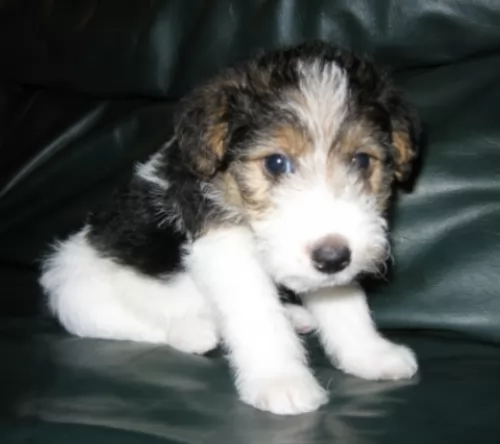 The Wirehaired Fox Terrier is a medium-sized dog, standing at between 33 and 38cm in height and weighing between 6 and 9 kg.
The Wirehaired Fox Terrier is a medium-sized dog, standing at between 33 and 38cm in height and weighing between 6 and 9 kg.
The face is fairly long and he has semi-erect, semi-floppy ears and the high set tail is usually docked. The double coat is wiry, curly and coarse and is essentially white with tan or black markings. White is always the predominant color of the Wire Haired Fox Terrier.
This little dog is cheerful, cheeky, playful, feisty, lovable and full of the joys of life. He is also strong-willed and independent.
He makes a great playmate for kids and loves being in the company of his human family. He will get on well with other pets in the family too.
He is intelligent which means you can have him easily trained and socialized and the kids will love to teach him some tricks too. He is a high energy dog and will require a good dose of exercise.
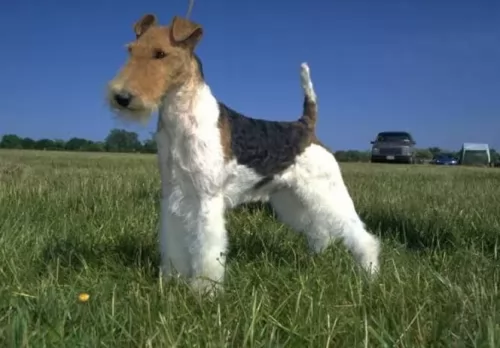 One thing is for sure – when you bring a Wire Haired Fox Terrier into your home, you’re going to have a dog with endless energy. It is why they make such good pets when you’ve got kids in the house.
One thing is for sure – when you bring a Wire Haired Fox Terrier into your home, you’re going to have a dog with endless energy. It is why they make such good pets when you’ve got kids in the house.
They like to please their owners and they respond well to training and socialization. They’re also brave and protective, making good watchdogs.
They’re loving, loyal and companionable, and there are plenty of stories about the loyalty of these dogs. Anyone who has had one of them as a pet will tell you what splendid dogs they are.
 The Scottish Deerhound does face some serious challenges on the health front. These include:
The Scottish Deerhound does face some serious challenges on the health front. These include:
• Cystinuria – recessive disorder that causes an inability for cystine to be filtered from the urine.
• Gastric Dilatation Volvulus – otherwise known as bloat and it can be life threatening if not treated quickly.
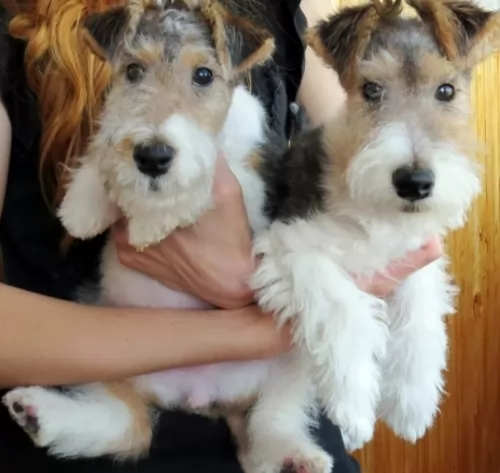 These robust little dogs can succumb to any one of the many common dog illnesses there are -
These robust little dogs can succumb to any one of the many common dog illnesses there are -
The Wirehaired Foxy is a healthy dog, but it is thought that Epilepsy could be a problem with this breed. Your spunky dog may seem a little bit confused before he falls to the floor lying on his side and twitching like he’s having a bad dream.
This is brought on by uncontrolled bursts of electrical activity in the dog’s brain. The seizure can last for a minute or so but even so, whether it is a twitch or violent shuddering, it can leave you shocked and disturbed.
He can sometimes even urinate during the seizure. It is imperative to get your pet to the vet who will know precisely how it can be controlled.
Dental disease is also a common problem with dogs and unfortunately, your Wire Haired Fox Terrier also battles with this. The problem starts with tartar build-up on the teeth and then it can cause infection of the gums and roots of the teeth.
Left unattended to, your pet could lose his teeth, and it jeopardizes your pet’s health as well.
 1.Feeding the puppy – Feed a high quality large or x large puppy dogfood at least 3-4 times a day. Do not overfeed.
1.Feeding the puppy – Feed a high quality large or x large puppy dogfood at least 3-4 times a day. Do not overfeed.
2.Feeding the adult – Feed a high-quality adult large or x large dog food once or twice a day. Do not overfeed.
4. Games and Exercises – The Deerhound needs plenty of exercise in a safe place where they have plenty of room to run. A small yard or life on a leash are not enough for this energetic breed. Play fetch, course running, Like the Greyhound they will be couch potatoes if you let them but that will hurt their health. Lure Coursing or hare coursing are good. Coyote hunting. Find space where they can run for the joy of running. Never force them to run – like along a bicycle
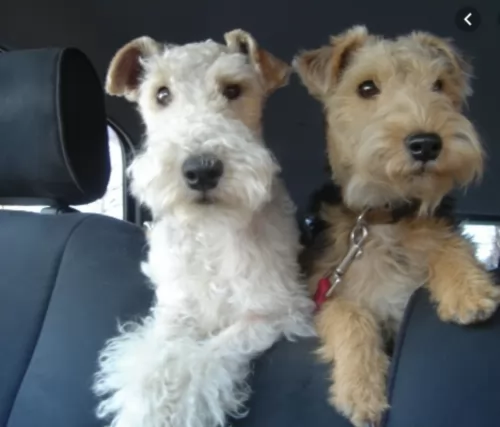 Groom your pet. Brush twice weekly. Wire Haired Fox Terrier owners like to hand their pets in at professional groomers to have their hair cut short and made more manageable. The hair is kept quite long around the muzzle.
Groom your pet. Brush twice weekly. Wire Haired Fox Terrier owners like to hand their pets in at professional groomers to have their hair cut short and made more manageable. The hair is kept quite long around the muzzle.
Provide your pet with the best food there is. Always buy high quality food that can contribute to your pet’s health and which is suitable for his size, age and activity levels. The Wire Haired Fox Terrier is inclined to be a greedy dog and with a dog like this weight gain can slowly increase and can become a health problem.
Spay or Neuter. This is an excellent idea for your pet if you don’t want puppies. Not only that, spaying or neutering actually decreases the likelihood of your pet getting some types of cancer.